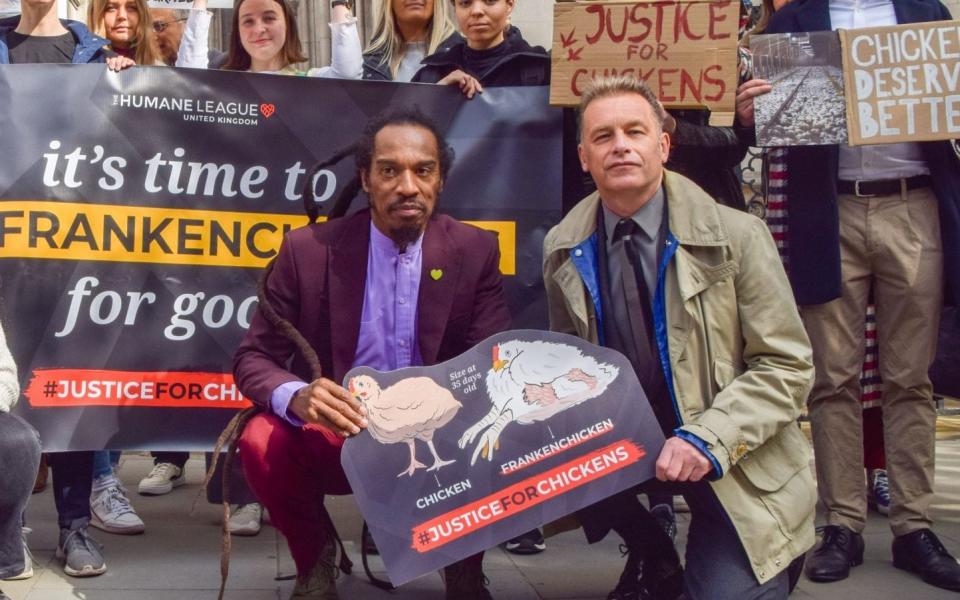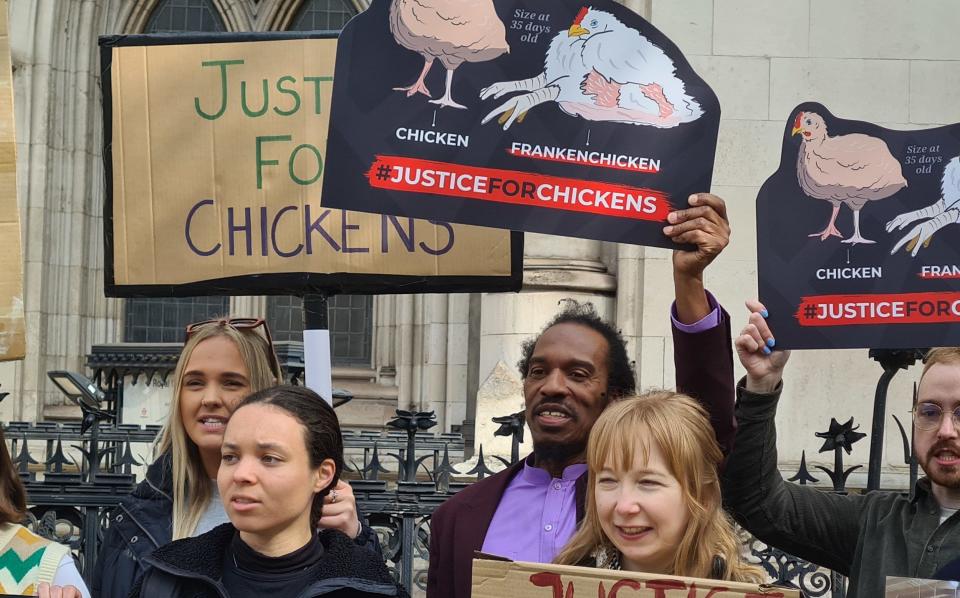The court battle over ‘Frankenchickens’ threatening the Sunday roast

High court judges are this week being asked to decide whether to ban so-called “frankenchickens”, birds farmed for supermarkets that have been selectively bred to grow faster and larger.
A case brought by campaign group The Humane League has reached Britain’s most senior court, arguing that the farming practice should be outlawed for the welfare of chickens.
“Frankenchickens”, as campaigners have dubbed them, reach maturity 12 weeks quicker and can be up to twice the size of a typical farmed bird 50 years ago. They can go from egg to slaughter in just 35 days.
The selective breeding has helped ensure Britain has plentiful cheap chicken to furnish dinner tables across the country.
Yet campaigners, who include TV presenter and environmentalist Chris Packham, argue the breeding practice is unnatural and leads to severe health issues for the animals. What's more, they claim all this has been done purely for profit.
“A lot of these industries are not driven by simply feeding people and making a bit of a profit on top,” poet Benjamin Zephaniah, who is supporting the legal challenge, told the Independent outside the High Court this week. “It’s making maximum profit. And I can’t really think of another word but greed.”
It is a characterisation that chicken farmers would scoff at.
Far from greedy profiteering, many farmers say they are struggling to make ends meet. In fact, the industry is now warning of potential chicken shortages as soaring costs push many to give up altogether.

The British Poultry Council said this week the industry had hit “breaking point”. Many producers say they are losing money on each bird that they rear.
Chief executive Richard Griffiths said this week: “The drive to keep food affordable under exceptional market conditions, where the cost of production is not being returned through the marketplace, is rendering poultry meat businesses unviable.”
Whatever the outcome of the High Court case, supermarket chicken faces a difficult future. A traditional Sunday Roast bird will become even dearer and may even be harder to get hold off.
Farmers are thought to have cut back the size of their flocks by around 10pc since the middle of March.
“We can’t afford to produce the numbers and not be getting the returns,” Griffiths explains.
Smaller flocks mean fewer chickens on shelves and higher prices. Shortages cannot be ruled out, just as eggs were difficult to get hold of in recent months.
“I’d say we’re now in the same position where tomato producers were and where egg producers were, in that the costs of production are just going up so rapidly,” Griffiths says.
Jo Hilditch, who owns Whittern Farms on the Herefordshire Welsh Borders and who has been in the sector for 30 years, says: “I've never felt as depressed as I do right now about this industry.”
There are no “frankenchickens” here. At her farms, welfare is front and centre.
"My managers are primarily stockmen who are passionate about looking after the chickens albeit for a relatively short life."
Yet the economics of caring for poultry currently don’t add up. Hilditch is not making any money from the work.
Supermarkets say that they work in partnership with their suppliers “but they’re just not,” Hilditch says.
Major grocers have been battling to limit increases in the cost of a chicken, gambling that even selling the birds at a small loss will help get customers through the door where they can spend more.
Fresh chicken prices have risen by less than 14pc since last May, according to figures from Assosia, while the typical grocery basket as a whole has risen by 17pc.
At Hilditch's farm, costs have risen by 40pc on average over the last year. Electricity bills are up, fuel for farm equipment has jumped and feed costs too. Even the cost of cleaning out pens and farm houses has soared, leaping a huge 60pc.
Hilditch says many farmers won't survive unless supermarkets yield and start paying higher prices.
“And, of course, the Government isn't keen on pushing because they want food prices to be cheaper, given the cost-of-living crisis going on. We understand that too, but a lot of farmers will be in trouble if things don’t change.”
Currently, around two thirds of chicken meat eaten in Britain is reared in this country.
However, Griffiths, of the British Poultry Council, says more chickens are now being imported from Spain, undercutting British farmers on price.
“It’s a false economy to rely on imported food, because we'll be at the whim of whoever is sending it to us," he says.
“If we reduce our domestic production, then of course those imports are going to get more expensive, because there's no competition."
The British Poultry Council wants the Government to use its buying power to boost industry, committing to only serving homegrown meat across public services such as the NHS. Between 5pc and 10pc of food production goes through public procurement.
“It really could be an opportunity for the Government to show that it is backing British,” says Griffiths. “It's not about handouts or subsidies or grants. It's about a fair price.”

For now, Westminster's attention is focused on the high-profile “Frankenchicken” battle.
This week lawyers for Environment Secretary Therese Coffey argued that there was no “scientific consensus that fast-growing meat chickens have a genetic make-up which means they cannot be kept without detriment to their welfare”.
They added that the government had “no ‘policy’ of permitting any particular breed of chicken to be kept”.
Farmers will be watching the case closely. Forcing the Government to change how it views the practice would guarantee major changes in the industry.
Yet many argue that there is a simpler way to improve the welfare for birds: pay more for chickens.
One poultry farmer says: “If the economics don’t add up, you will get more people cutting corners and not behaving ethically.”
Hilditch says: “What it comes down to is that the consumer has simply got to pay more for chicken, because the costs that we’re seeing are just terrible.”
With campaigners battling it out in the High Court and farmers struggling to make ends meet, the future of the Sunday Roast chicken is up in the air.

 Yahoo Finance
Yahoo Finance 